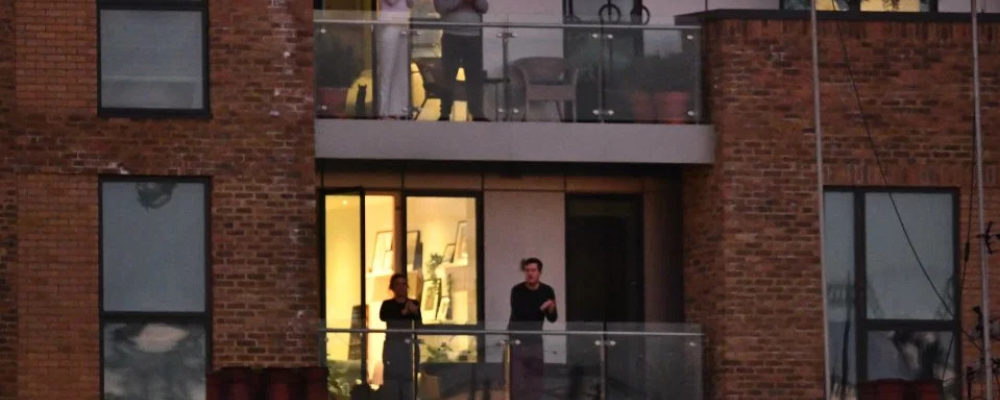Spoiler alert. This article doesn’t offer the usual prescriptions for managing this crisis, conquering the complexity of the repercussions of the pandemic, or ‘powering through’ lockdown. There are plenty of those pieces around if you want them.
What I hope to do instead is argue that our experience of living through the personal, social and economic shock of Covid-19 can reveal something to us about the nature of management and organisational change. It is a perspective that, it seems to me, the world needs and is hungry for. My deep regret is for the times of profound tragedy, fear and disruption that I am drawing upon to make this point.
What lies between us
Viruses spread between people. While it can rightly be said that any one of us has the virus in our bodies, it is its contagion that concerns us most – the invisible transmission from one person to another with unpredictable consequences. A bitter reminder that we’re not isolated, atom-like from each other, but connected, sometimes in puzzling, invisible ways.
What also gets transmitted are the new social norms that arise in response to the pandemic: new ways of behaving that catch on more rapidly, becoming more widespread than the virus itself. Some of the changes we adopt are prompted by a call from government, but always - and only - take hold because of the small changes that we all make to what we are doing. Very quickly, new patterns of social behaviour emerge and are made visible to us through the raft of mass media at our fingertips.
Sudden emptying of shelves in supermarkets, ensemble applause for NHS workers, revulsion and shaming of those apparently flouting new rules on social distancing: all are examples of new phenomena springing into existence, not organised by some great mind in authority, some controlling figure with an eye on the system, but as a result of the little things each of us are doing both as individuals and as a society at the same time. In this way, the sudden social shock of Covid-19 reveals something of the way in which changes in society, in communities, in organisations, generally do come about over a broader sweep of history.
One of the first things that happened in response to recent social distancing measures was the creative ways that people found to reach out to each other in new ways. The fitness videos, listening parties, virtual pubs, and apps like Zoom and Houseparty that were suddenly thrust centre stage. What this shows is that connection to one another is so vital to our lives, not as autonomous isolated beings but as social and intersubjective animals.
For me, this says something profound about how and why change happens, and about concepts such as culture and values. In management terms, these are all ideas that we’re used to thinking about in certain ways that no longer hold firm if we are to take seriously what we’re seeing happen around us in the troubling circumstances prompted by the pandemic.
Change in our behaviours and our accepted ways of doing things emerge and get revealed through the compounding effect of collective action that is both individual and shaped by broader societal patterns at the same time. ‘The way we do things around here’ is a beautifully complex and dynamic feature of our lives. So why do we insist on old ways of thinking about culture and values as things that are harnessed and designed by managers? Why do we continue to extol leadership as an individual set of skills that enables well-meaning people to shape organisations as systems designed to deliver their chosen strategies? Why do we think that change only happens if we manage it, drive it and ‘unfreeze’ people? All hail the transformational leader?
Time to think again.
So, what about leadership, then?
I promised no prescriptions and I stick to that, except to offer some questions and provocations for people in positions of influence. Much of the stuff coming out from well-meaning people, institutions and publications is about how to harness all this new complexity, how to step up and power through.
For me, these are futile, out-dated calls to action that are blind to the revelations that this otherwise distressing and devastating pandemic can offer. There are things you can do – need to do – to adapt to the pressures of working – if you’re lucky enough to be able to keep working or sufficiently distant from the front line to have the luxury of some thinking time. Reach out. Use technology to keep in touch with your colleagues. To keep in touch, not check up on them. You were never meant to manage people in that way, but to care, to support and to weigh in from time to time. Listen, encourage and be kind. Notice. People will be feeling fearful, guilty, lonely, disoriented. You’re no different – you depend on your colleagues as they depend upon you, so now’s the time for humility, compassion and revealing just a little more of that vulnerable human-ness that you’ve been conditioned to hide away because of your job title.
The world around us has experienced a seismic shock, revealing to us the nature of what it means to be human, to co-operate, to exist not as isolated beings – even in isolation – but intersubjectively, together. If headlines like “Leadership is more important than ever” appeal, then fine, but remember that leadership and change are things we experience together, not exert on one another. “These unprecedented times” are as unprecedented as always. “The current uncertainty” is a reminder that life is – mercifully – unpredictable. And when all this is over, there is no normal to go back to, but a future indelibly marked with what’s happening now.




